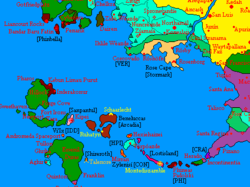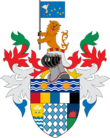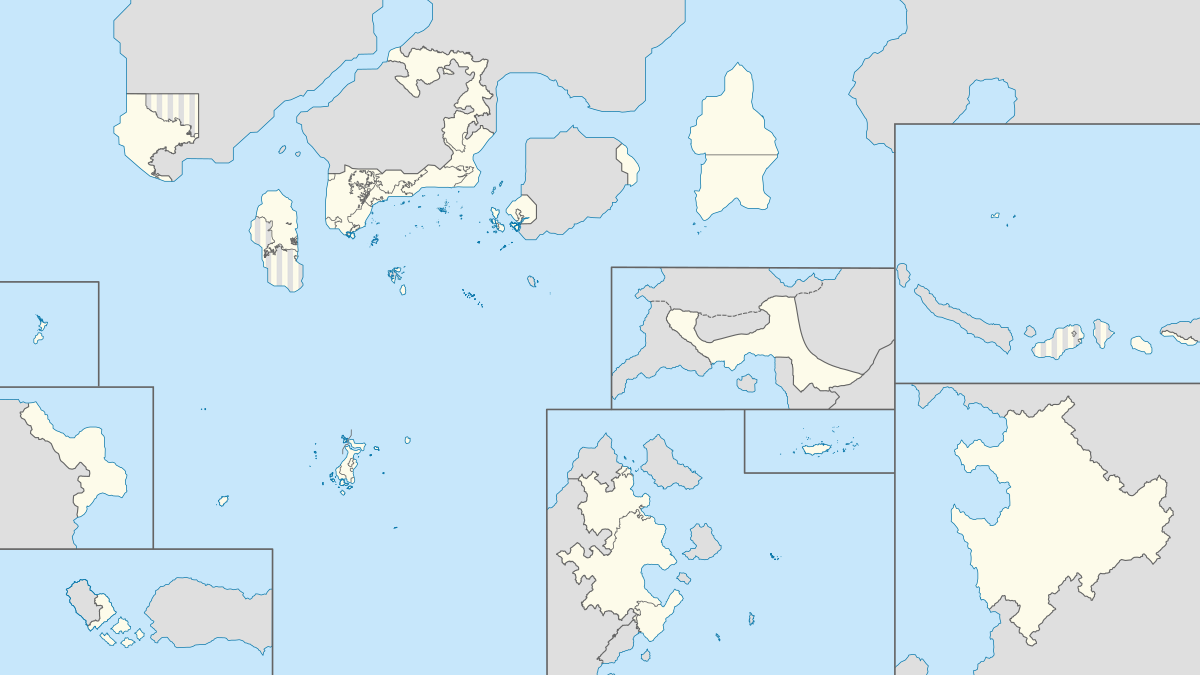Phinbella
| Order of the Holy Lakes in Right of the Federal Republic of Phinbella List
| |||
| |||
| Motto: | |||
| Anthem: Die Stem van Phinbella The Call of Phinbella Suara Phinbella 핀벨라의 소리 Media:Die Stem van Phinbella (Aegukga) 2020.ogg | |||

| |||
| Map versions | |||
| Capital | Negara Awan | ||
| Largest city | Liancourt Rocks | ||
| Official language(s) | Phineaner Taesongean Afrikaans Romansh Sangunese | ||
| Official religion(s) | Secular
| ||
| Demonym | Phinbellan | ||
| - Adjective | Phinbellan | ||
| Government | Federal parliamentary republic | ||
| - President | Muhammad Furkorn Mat Jeen | ||
| - Chairman of the Council of Ministers | Yvar Onigawa Worthyngton | ||
| - Legislature | Parliament of Phinbella | ||
| Establishment | 6th January RP 2615 | ||
| Area | 325,429.6 km2 | ||
| Population | 86,963,974 (1730 AN) | ||
| Active population | 2 | ||
| Currency | Phinbellan florin (ðƒ), Hurmu crown | ||
| Calendar | |||
| Time zone(s) | CMT+4 (NAT) and CMT+5:20 (PPT) | ||
| Mains electricity | |||
| Driving side | Left | ||
| Track gauge | |||
| National website | Official website | ||
| National forum | Official forum | ||
| National animal | Platypus | ||
| National food | Kimchi | ||
| National drink | Sirap Bandung | ||
| National tree | Pinus strobus | ||
| Abbreviation | PHI | ||
Federal Republic of Phinbella (FRP; Phinbella; Phinbellan: Repablik Persekutuan Phinbella; Gangwol Phineaner: Repablik Pesekutuai Phinbella; Taesongean: 핀벨라연방공화국; RR: Pinbella Yeonbang Gonghwaguk; MR: P'inbella Yŏnbang Konghwaguk; Afrikaans: Federale Republiek van Phinbella; Romansh: Republica Federala Phinbella; Sangunese: フィニべラ連邦共和国 Finibera Renpō Kyōwakoku), officially as the Order of the Holy Lakes in Right of the Federal Republic of Phinbella (Phinbellan: Perintah Tasik Suci di kanan Repablik Persekutuan Phinbella; Taesongean: 핀벨라연방공화국오른쪽에있는신성한호수의질서; RR: Phinbella Yeonbang Gonghwaguk Oreunjjok-e Ittneun Shinseonghan Hosu-ui Jilseo; MR: P'inbella Yŏnbang Konghwaguk Orŭnjjok-e Ittnŭn Shinsŏnghan Hosu-ŭi Chilsŏ) is a federal republic located in western Keltia which was de facto established on January 6, RP 2615, after Phinbella's co-founder, Ikmal Hakimi signed the New Permata Treaty and the Micrasian territorial claim was successful. Phinbella is a realm of the Order of the Holy Lakes and was a member of the Confederation of the Phineonesian Nations, along with Forajasaki and Plazas de Irian. Territory of Phinbella shares border only with other realms of Amaland, Karnamark, Forajasaki and Plazas de Irian, also borders with Nouvelle Alexandrie and Constancian Nijima.
Phinbella is organised into 14 territories of the states and 4 special administrative territories, as well as the eight directly-administered territories for local government purposes. The Federal Republic of Phinbella also includes Permata Mutiara, Tanah Tōnán'hyôrï, Oystra Stoorskerið (a dependent territories); and the Ross Dependency, which is Phinbella's territorial claim in Micrasian Antarctica.
Etymology

|
This article or section is a work in progress. The information below may be incomplete, outdated, or subject to change. |
The meaning of Phinbella itself is: a pormenteau of famous couple in Phineas and Ferb series, Phin: it's Mat Phineas Flynn, a Zaipinichi Peranakans boy, and Bella: it's Isabella Garcia-Shapiro, a Mexican girl.
History
Early years
The Free Republic
Cyberia era
Versian empire
Provisional Government
Caputian era
Current
Geography
Climate
Hydrology
Environment
Government and politics

 |
|---|
|
|
|
|
Phinbella is a federal republic with a parliamentary democracy. The Constitution of the Federal Republic of Phinbella is the supreme law of the land, establishing the structure and responsibilities of government. Its head of state is the President, directly elected by the people with universal suffrage, and he exercises executive power on the advice of the federal prime minister. The head of the federal government is the Chairman of the Council of Ministers nominated by the president through the support of a majority of the people, and it is his responsibility to appoint senior ministers, Foreign Ministers and others in the federal government. A cabinet of parliamentarians is chosen by the Chairman and formally appointed by the President.
The president is elected directly by the people through universal suffrage for a renewable period of eighteen months. Presidential elections can be declared to take place three weeks before the term of office expired, reserved for different ethnic communities, only presidential candidates from every different ethnicity were elected by all Phinbellans. Only members of such ethnic communities can be eligible to be the next presidential candidate.
The legislature in Phinbella is bicameral, it is known as the Parliament of Phinbella, serves as the body that enacts Phinbellan laws and approves budgets. The parliament are consist of the House of Senate, the upper house which have 70 members who called as the senator, and the House of Majilis, the lower house which has 243 members who called as the member of the Parliament (abbrevated to MP), all members are directly elected where it is elected from 174 constituencies in the Federation, 63 special administrative regions representative and six aboriginal constituencies. Each of these constituencies is only an individual who will be a candidate to contest in the election. All elections are held using quite different methods, namely largest remainder method, instant-runoff and first-past-the-post. Until today, only all independent parliamentarians have formed a government since RP 2615, after seven years of elections during the Phinbellan provisional government. In the elections held in RP 2608, the Phinbellan People’s Party had won a large majority of the provisional parliamentary seats. The most effective opposition party during the provisional government in Phinbella was the Democratic Union Party. In XIV.1728 AN, a post-accession general election was held which saw that the Pan-Phineonesian-PETIR Coalition won 86 seats, and a new coalition government was formed with the participation of the Dependencies bloc, the Manschūhōrian bloc and even the Special Administrative Regions bloc from the pro-Establishment.
The judicial system in Phinbella is based on English common law (brought in from northern Keltia), mixed with sharia law for cases reserved for Umraist. Phinbellan criminal law is based on the Local Penal Code influenced by the Sangunese and Indian civil code established in RP 2600 during the Phinbellan provisional government, it was first adopted at that time and it remains the basis of the criminal code in Phinbella in force with a few exceptions, amendments and repeal as well as modifications after RP 2615. Meanwhile, Phinbella’s statutory law comes from Phinbella’s legislature and constitution, where the constitution requires presidential promulgation laws to be passed by the Parliament. The main body of statutory law in Phinbella is influenced by the Six Code system. Phinbella has a court system that is divided into six basic levels, namely the Supreme Court, the Constitutional Court, the Sharia Court and three lower level courts.
Foreign relations and affairs
During the era of Phinbellan provisional government, Phinbella had not established bilateral relations until in early RP 2615, Phinbella had become a member of MCS, however Phinbella had not joined any other Micrasian organizations including MTO. These foreign diplomatic relations are managed by the President through the Ministry of Foreign Affairs and its ministers. Until RP 2620, Phinbella has established diplomatic relations with the Thraci Confederation (Thracistan, Antakia, Hazar and Batır), New Batavia, Hurmu and Mercury.
Defense
Defense in Phinbella is under the cooperation of the Phinbella Ministry of Defense led by Efstathios Aggelidou and the Phinbellan Ministry of Home Affairs led by Hafizi Nur Zamanian. The Phinbella Defense System (PhDS) is divided into three entities namely the Phinbellan Armed Forces (PhAF), the Phinbellan Federal Police Agency (PhFPA or FPA) and the Organization Without Cool Acronym (OWCA).
The Phinbellan Armed Forces is a federal level military agency that maintains nationwide sovereignty in Phinbella, which is now part of the Territorial Reserve Force in Hurmu Fyrð since joining the Order of the Holy Lakes in 1728 AN. The Phinbellan military consists of the Phinbellan Army, the Phinbellan Navy, the Phinbellan Air Force, the Phinbellan Coast Guard and the Phinbellan Medical Service. The Phinbellan Armed Forces is also having military forces, the Army of the Federation of Phinbella for defended the territories in Phinbella, The PhAF also has garrisons in each of the special administrative territory. A total of 88,900 military personnel as of RP 2617. They are armed with a mix of locally made weapons, vehicles and military equipment. While the Air Force has a staff of 1,200 people and also has about 51 aircraft.
In early RP 2616, Phinbella had sent its troops as well as the Army of the Federation of Phinbella of 820 people including 382 volunteers to carry out humanitarian missions in Nijima Island, and Phinbella had occupied a small part of the west of the island to make it its new territory. Recently the Phinbellan army was assigned to guard Western Nijima’s international border with its neighboring country. During the mission, his team provided medical treatment services to its members and civilians (residents of Nijima Island) injured by the Dromoskers attack, and also cleaned 992 cubic meters of water.
The law enforcement in Phinbella is the Phinbellan Federal Police Agency (PhFPA or FPA). The FPA was established in RP 2615, to replace the PhAF’s mission to solve all existing criminal problems within the Phinbella federal level. The foundation of the FPA aims to make Phinbella a paing country safe from criminals such as bribes, terrorists and other criminals. The FPA also set up a new unit, the Pan-Phinbellan Anti-Corruption Unit to handle cases involving corruption. The FPA consists of three police entities, namely the Police of the Free Area of the Federation of Phinbella which is divided into 28 police departments representing each of the territories, in each special administrative territory in Phinbella also has its own police force where each of these police units handles law enforcement in its area such as Kota Hilir Police, Police of the Tri-State Area, Tanah Baharuan Police Force and the Police of Oriental Taemhwan.
Organization Without Cool Acronym (OWCA) is an official intelligence agency at the federal level in Phinbella. Before FPA was established, OWCA was among the sub-branches of PhAF. Each territories and entities in Phinbella has its own intelligence body like MATA in Cyberaya. The OWCA has handled and resolved major cases in Phinbella, such as the money laundering scandal among politicians and the case involving Dr. Heinz Doofenshmirtz and others.
Administrative divisions

|
This article or section is a work in progress. The information below may be incomplete, outdated, or subject to change. |
 |
| Administrative divisions of the Federal Republic of Phinbella | ||||||||||||
|---|---|---|---|---|---|---|---|---|---|---|---|---|
| Entities | Special administrative territories | Phinbellan Unincorporated Territory | ||||||||||
| Territories | 17 territories | 4 territories | Syōnan Archipelago | Maritime Kachi Kochi Straits Settlements Extraterritorial Authority |
Ross Dependency | 4 unincorporated areas Niuē i Taman Lawang Kernsopol National Park | ||||||
| Collectivities | 11 cities and 50 districts | 20 collectivities | ||||||||||
| Notes | Some districts lie in more than one territory | Directly-administered territories | Special territorial authority | Phinbellan Maritime Territories administrative group (under the DITCRDLG) | Non-self-governing territory of Phinbella | Phinbella's Antarctic dependency | States in free association with Phinbella | |||||
Demographics
Cities
Race
Language

|
This article or section is a work in progress. The information below may be incomplete, outdated, or subject to change. |
Religion

|
This article or section is a work in progress. The information below may be incomplete, outdated, or subject to change. |
Education
Economy
Agriculture
Industry
Telecommunications
Tourism

|
This article or section is a work in progress. The information below may be incomplete, outdated, or subject to change. |
Science and technology
Cyber security
Aerospace engineering
Robotics
Biotechnology
Infrastructure
Transport

Phinbella has a technologically advanced transport network consisting of high-speed railways, highways, bus routes, ferry services, and air routes that crisscross the country. And also, Phinbellan Transportation Authority issues the own license plate, but Oriental Taemhwan Transportation Authority also issues too. Which means all of the vehicles in Phinbella must use a double license plate to cross the borders of Oriental Taemhwan territory if they want to go to a city in Phinbella that separated. The main national road network is the Phinbellan Federal Strategic Route and Exit Number System covering more than 41,009 km. Phinbella has its own expressways network over 1,799 km long and maintained by the Phinbella Expressway Authority, it connects Phinbellan territories with regional units in Oriental Taemhwan and Niuē i Taman Lawang, it also including existing expressways in Phinbellan Maritime Territories, Permata Mutiara and Ross Dependency. Expressways in Phinbella are quite special as they can only be traversed by car, bus, motorcycle, bicycle, rickshaw, ox and horse carriage, each highway has only six lanes and two lanes of motorcycles. The national speed limit on roads is 85 km/h and on highways and expressways is 120 km/h. Express bus terminals are available in most cities.
There are currently 2,431 kilometers of railway line in Phinbella, of which 767 km (477 mi) are double tracked and electrified. Rail transportation in Phinbella includes heavy trains, fast transit and monorail, and funicular railway tracks. Heavy trains are mostly used for passenger and intercity transport as well as some urban public transport, while LRT is used for urban public transport within the city. There are commuter rail services linking Rintis Island or Ume Momo with the city of San Fransōkyō and on the other, it connects Negara Awan with the New Territories International Airport in the New Territories. Monorail services are public transport services in several cities such as Negara Awan, Cyberaya, Martin-de-Viviès, Danville, Liancourt Rocks, Cyborges, Springwind Islands, San Fransōkyō, Suramadu and Kéijō, Maritimii-Maxhestics in the future will have monorail service and is expected to be built by RP 2616. Phinbella Railway Network has provided regular services to all available cities throughout Phinbella including Oriental Taemhwan and Niue i Taman Lawang, while the Phinbella Maritime Territories and the People's Corridor Territory of Permata Mutiara have their own railway network. The Phinbella Train Network also provides ETS services that use electric trains, it also provides a commuter service system known as "PRN Komuter". The Phinbellan high-speed rail system, PRN-KTX, has provided high-speed services along the Sinaran Pagi Line, Coastal Line and Senandung Malam Line.
Phinbella has 40 airports nationwide. The largest airline in the country is Platypus Airways which is also the main flag carrier in Phinbella, which provides international and domestic aviation services. Several domestic flight routes have been provided by other airlines such as Centrino Air, Skate Airways, Virgin Regional Airlines and Raya Airs, in addition Straits Toll Express provides domestic flights to the Springwind Islands at low-cost fares. Major cargo airlines include PhinKargo and DHQExpress. The New Territories International Airport, located in the New Territories, about 20 kilometers from Negara Awan, is Phinbella's largest and busiest airport and main gateway. Other major airports in Phinbella are Phineas Flynn International Airport located on Rintis Island, Kuala Pilahondan International Airport in Permata Mutiara, Victór Valèntich Flynn International Airport in Phinéas Padolski, Springwind Islands International Airport and Cyberaya Airport.
Energy
The energy infrastructure sector in Phinbella has been largely dominated by Tenaga Phinbella, Phinbella's largest electric utility company and other electrical utility companies, Permata Energy and Straits Electricity have provided electricity utility services only in the Phinbellan Maritime Territories and Permata Mutiara. Massive electricity generation in Phinbella is based on wind energy and solar energy. Wind power in Phinbella until RP 2616 it has achieved a installed capacity of 8,109 MW, meanwhile 4,428 MW of which is located offshore especially off the coast of New Territories, Rintis Island, Cyborges and Springwind Islands in particular, as well as in Permata Mutiara. As many as 3,000 turbines have been installed in Phinbella since RP 2615 has provided 42 per cent of its electricity demand during the year. Tenaga Phinbella, Permata Energy and Straits Electricity are responsible for the offshore wind farm project in Phinbella. Solar energy in Phinbella has an installed capacity of 5,280 MW of photovoltaics by the end of RP 2615.
Culture

|
This article or section is a work in progress. The information below may be incomplete, outdated, or subject to change. |
Cuisine
Entertainment


|
This article or section is a work in progress. The information below may be incomplete, outdated, or subject to change. |
Since the beginning of 2009, Gelak Khas is a first community policing drama series in Phinbella before Metro Squad and Roda-Roda Pulau Rintis (Wheels of Rintis Island), it is Phinbella's version of the Gerak Khas series are aired on KBS 2TV and is still aired today.
Public holidays

|
This article or section is a work in progress. The information below may be incomplete, outdated, or subject to change. |
Sports

|
This article or section is a work in progress. The information below may be incomplete, outdated, or subject to change. |
National martial arts in Phinbella







